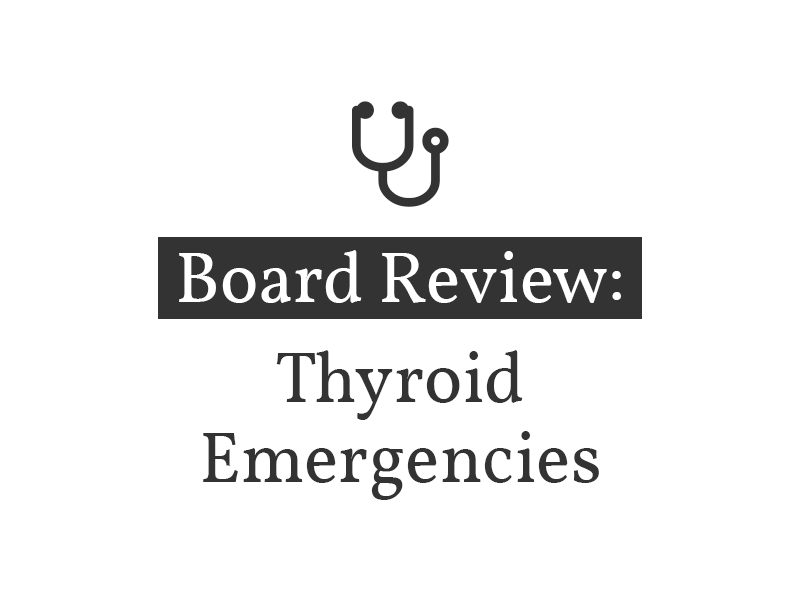SimWars
This post is part of a series developed in preparation for participation in ACEP SimWars. It contains a review of several prominent emergency medicine topics which may be relevant for board preparation. Unless otherwise cited, content is based on HippoEM videos.
Hyperthyroidism
Symptoms
| Constitutional | Weight loss, heat intolerance, perspiration |
| Cardiopulmonary | Palpitations, chest pain, dyspnea |
| Neuropsychiatric | Tremor, anxiety, double vision, muscle weakness |
| Neck | Fullness, dysphagia, dysphonia |
| Musculoskeletal | Extremity swelling |
| Reproductive | Irregular menses, decreased libido, gynecomastia |
Signs
| Vital signs |
Tachycardia, widened pulse pressure, fever |
| Cardiovascular |
Hyperdynamic precordium, CHF, atrial fibrillation, systolic flow murmur |
| Ophthalmologic |
Widened palpebral fissure, periorbital edema, proptosis, diplopia, restricted superior gaze |
| Neurologic |
Tremor, hyperreflexia, proximal muscle weakness |
| Dermatologic |
Palmar erythema, hyperpigmented plaques or non-pitting edema of tibia |
| Neck |
Enlarged or nodular thyroid |
Causes
- Grave disease
- Mechanism: thyroid-stimulating antibodies
- Female > Male (10x)
- Findings: ophthalmopathy (lid lag), infiltrative dermopathy (pretibial)
- Toxic adenoma, toxic multinodular goiter
- Mechanism: Excess thyroid hormone production
- Thyroiditis
- Mechanism: inflammation results in increased thyroid hormone release, typically followed by depletion and TSH suppression resulting in hypothyroidism
- Signs/symptoms: tachycardia, weight loss, irritability, sweating, anxiety, heat intolerance
- Subacute thyroiditis
- Post-viral
- Symptoms: hoarseness, dysphagia, painful thyroid
- Hashimoto
- Drug-induced: Lithium, amiodarone
- Trauma: surgical, direct
Thyroid Storm
- Essentially an exaggeration of thyrotoxicosis featuring marked hyperthermia (104-106°F), tachycardia (HR > 140bpm), and altered mental status (agitation, delirium, coma).
- Precipitants
- Medical: Sepsis, MI, CVA, CHF, PE, visceral ischemia
- Trauma: Surgery, blunt, penetrating
- Endocrine: DKA, HHS, hypoglycemia
- Drugs: Iodine, amiodarone, inhaled anesthetics
- Pregnancy: post-partum, hyperemesis gravidarum
- Scoring (Burch, Wartofsky)
- Management
- Supportive measures
- Volume resuscitation (with MVI, Thiamine) and cooling
- Benzodiazepines for agitation
- Beta-blockade
- Propranolol 60-80mg PO q4h
- Propranolol 0.5-1.0mg IV, repeat q15min then 1-2mg q3h
- Esmolol continuous infusion
- MTZ/PTU 1-hour prior to iodine
- Methimazole 20mg (except pregnancy)
- Propylthiouracil 600mg (hepatotoxic)
- Steroids: dexamethasone
- Iodine
- Endocrinology consultation
Hypothyroidism
Symptoms
| Constitutional |
Weight gain, cold intolerance, fatigue |
| Cardiopulmonary |
Dyspnea, decreased exercise capacity |
| Neuropsychiatric |
Impaired concentration and attention |
| Musculoskeletal |
Extremity swelling |
| Gastrointestinal |
Constipation |
| Reproductive |
Irregular menses, erectile dysfunction, decreased libido |
| Integumentary |
Coarse hair, dry skin, alopecia, thin nails |
Signs
| Vital signs |
Bradycardia, hypothermia |
| Cardiovascular |
Prolonged QT, increased ventricular arrhythmia, accelerated CAD, diastolic heart failure, peripheral edema |
| Neurologic |
Lethargy, slowed speech, agitation, seizures, ataxia/dysmetria, mononeuropathy, delayed relaxation of reflexes |
| Musculoskeletal |
Proximal myopathy, pseudohypertrophy, polyarthralgia |
| Gastrointestinal |
Ileus |
Causes
- Hashimoto: auto-antiboids
- Thyroidectomy
- Radiation, radioactive iodine ablation
Myxedema Coma
- Precipitants
- Critical illness: sepsis (especially PNA), CVA, MI, CHF, trauma, burns
- Endocrine: DKA, hypoglycemia
- Drugs: amiodarone, lithium, phenytoin, rifampin, medication non-adherence
- Environmental: cold exposure
- Recognition
- History: hypothyroidism, thyroidectomy scar and acute precipitating illness
- Hypothermia: temp <95.9°F (or normal in presence of infection)
- AMS: lethargy, confusion, coma, agitation, psychosis, seizures
- Hypotension: refractory to volume resuscitation and pressors
- Bradypnea: with hypercapnia and hypoxia
- Skin: non-pitting edema of face and hands
- Hyponatremia
- Management
- Airway protection
- Fluid resuscitation
- Thyroid hormone replacement
- Young, otherwise healthy patients: T3 10ug IV q4h
- Elderly, cardiac compromise: 300ug IV x1
- Steroids: dexamethasone 1h prior to thyroid hormone
- Treat precipitating illness
Interpretation of Thyroid Function Tests
| Condition |
TSH |
T4 |
| None |
Normal |
Normal |
| Hyperthyroidism |
Low |
High |
| Hypothyroidism |
High |
Low |
| Subclinical hyperthyroidism |
Low |
Normal |
| Subclinical hypothyroidism |
High |
Normal |
| Sick euthyroid |
Low |
Low |

